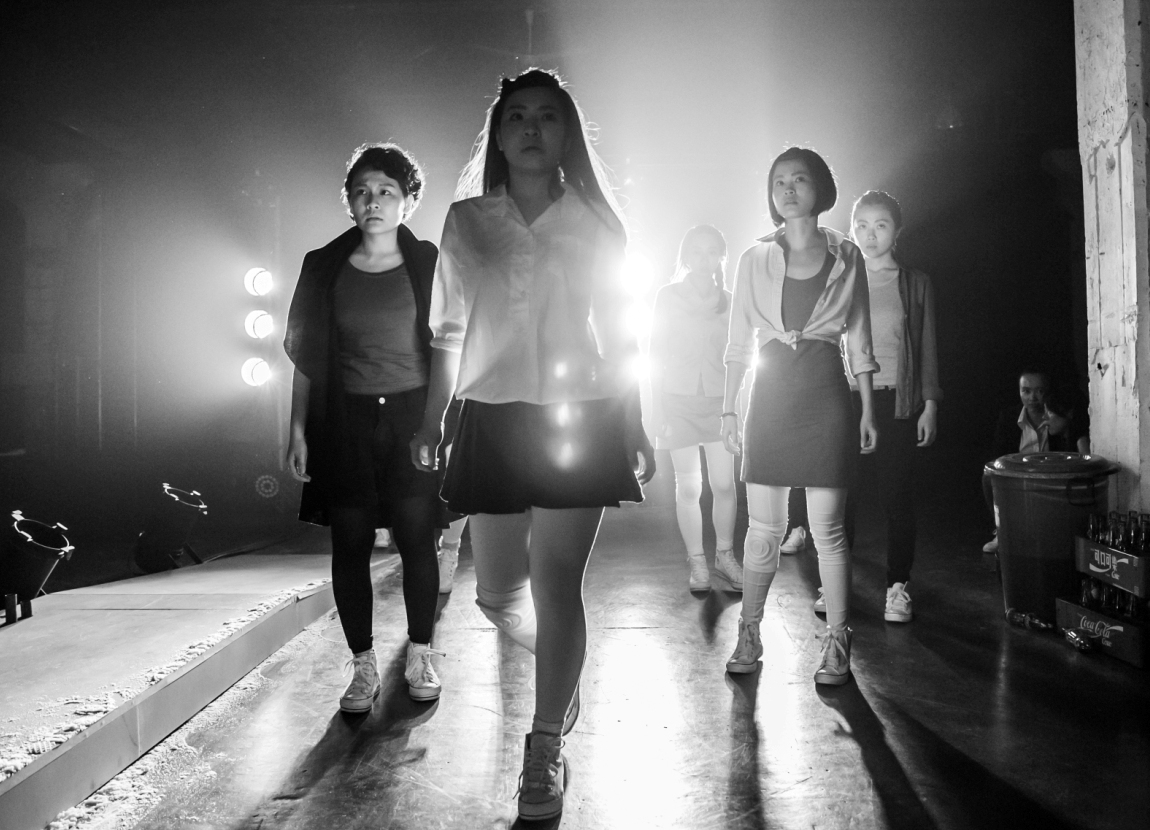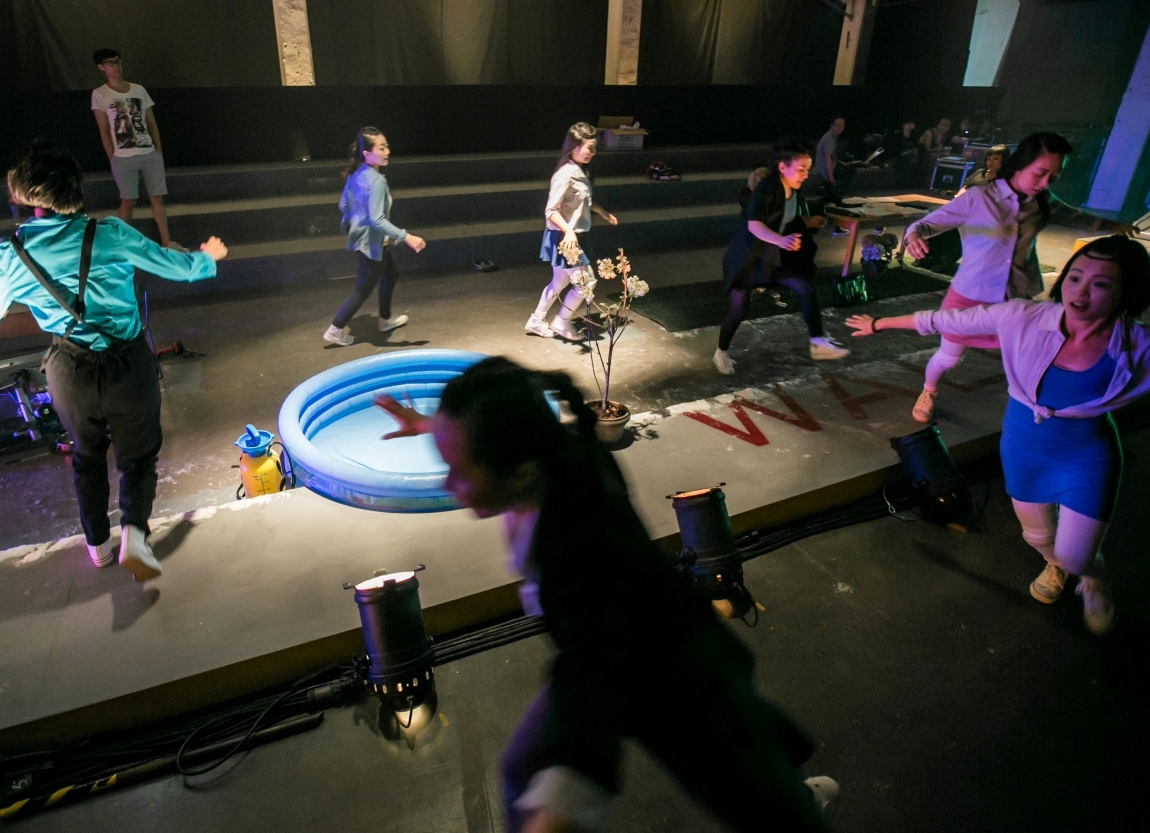鴻鴻改編的《女武神》以家庭關係潛藏的黑暗與張力,凸顯政治權力的操作與革命的可能,也及時反映了創作期間(2014年1─6月)台灣社會風起雲湧的反核以及太陽花運動。〈女武神飛行〉的高亢樂聲中,一座發電廠興起,一群勞工在底層默默地處理廢料。兩個不幸的家庭互相敵對──父與女的愛恨、夫與妻的冷戰、小三與小三的對照,兄妹私奔、父子逆倫,失敗的丈夫、叛逆的青年……19世紀華格納對家庭崩壞的刻畫,被放置在更為激烈的21世紀,反映更鮮明的社會與政治議題。
在這由重重「契約」型構的現代社會中,主掌者「契約之神」一面依法行政,一面絞盡心機明裡暗裡越軌。這樣的政客與企業家,我們非常熟悉。他以為他在拯救世界,事實上,也許他才是災難的根源。在結尾布倫希德沈睡時,觀眾沒有看到她起身謝幕。誰能喚她從夢中醒來?而觀眾從戲裡醒來時,也能夠從集體的惡夢中醒來,改變世界嗎?
黑眼睛跨劇團 Dark Eyes Performance Lab
由詩人、電影及劇場導演、策展人、藝評等多重身份的鴻鴻,於 2009年創立「黑眼睛跨劇團」。以戲劇為主體的「黑眼睛跨劇團」,積極嘗試各種跨領域、跨文化、跨時空行動,試圖接軌藝術實驗與大眾趣味,以多年經驗做小型劇場的累積,朝中、大型劇場的製作及推廣發展。
Being a poet, a movie and theater director, a curator and an art critic, Hung Hung founded Dark Eyes Performance Lab in 2009. Although Dark Eyes Performance Lab primarily produces theatrical works, it is also actively involved in various kinds of cross-disciplinary, cross-cultural performances that also span time and space. It attempts to combine artistic experimentation with public amusement, accumulating experiences in producing small-scale theater. They also aim to produce and promote medium and large theater in the future.
鴻鴻
蘇匯宇
李建常
周莉婷
黃雅筠
余彥芳
廖敏慈
徐華謙、朱倩儀、余彥芳、余佩真、高俊耀、許雅雯、陳雅柔、陳以恩、彭子玲、曾歆雁、廖圓融、賴玟君、鍾琪、蘇志翔
劉至芸
方姿懿
胡皓恩
周佳儀
黃得峰
蕭孝傑、張芝維
華山1914文創園區
關鍵字
- 劇場
- 華格納
- 318學運
- 社會運動
藝術家談作品
不去妖魔化任何人。
鴻鴻:「不去妖魔化任何人,讓觀眾投入這個角色,再認同女兒的反叛,這才是劇場。讓你看到過程,才知道價值觀如何選擇。」
評審談作品
這是真正的教育劇場,不是教育觀眾,而是和觀眾共同學習。
入圍理由 Reason for Nomination
海納‧穆勒(Heiner Müller)認為,改編是還原經典的政治性,是經典的再政治化,按照這個標準,鴻鴻成功的將華格納的女神叛變,連結上台灣現今的緊急狀態。難得的是,這次的政治改編不落政治正確的俗套,戲裡的角色並不是宣揚政治理念,而是尋找反抗的可能,學習行動。這是真正的教育劇場,不是教育觀眾,而是和觀眾共同學習。也因此,對照當今的社會運動,這齣戲既不會淪為政治工具,因為學習就是對既定的想法提出質疑,就像劇中一再的質疑法的效力;更不至於消費議題,因為議題都有其時效性,學習卻是為了面向未來,想像新的世界。誠如劇末召喚一場不再崇拜英雄、不再依賴強人的革命。 提名觀察人 ─ 郭亮廷
Heiner Müller believed that adaptation restores classical political nature, and re-politicizes the classics. Assessed by this standard, director Hung Hung has successfully connected the mutiny of Wagner’s goddess to the current state of crisis in Taiwan. This political adaptation is exceptional in its resistance from politically correct stereotypes. The characters in the play do not espouse specific political ideals, but instead seek possibilities for resistance and learn how to organize actions. This is educational theater in its truest form. One that does not educate the audience, but learns alongside the audience. In light of current social movements, this play cannot be relegated to becoming a political tool. Just as the process of learning requires a constant questioning of established ideas, the play repeatedly questions the effectiveness of law. Nor will it be confined to issues of consumerism, since all issues have a period of relevance. Learning is an act that enables confronting the future and imagining a new world, like a revolution that no longer worships heroes nor depends on strongmen that is summoned at the end of the play. Nominator: KUO Liang-Ting






